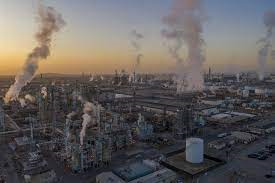By Jemimah Chungu and Josephine Mwachindalo
Thirty-two countries have joined the U.S. in a pact developed with the E.U. to reduce methane emissions by 30 percent by the year 2030. It is part of a focus aimed to slow global warming before a major U.N. climate summit in Glasgow next month.
Methane is the second-most prevalent greenhouse gas after carbon dioxide, but it is much more potent in the short term .Its ability to heat the planet is a cause for fear globally. Methane is the main component of natural gas, and is also released into the atmosphere from landfills, livestock and thawing permafrost.
The conference aims to persuade nations to slow global warming so that temperatures rise no more than 1.5 degrees Celsius compared with levels before the Industrial Revolution — the threshold beyond which scientists say the dangers of global warming grow immensely.
While the four heaviest emitters of methane — China, India, Russia and Brazil — have not joined the pledge, nine of the world’s top 20 methane polluters have signed on, among them Canada, Indonesia, Pakistan, Mexico, Nigeria, Argentina and Iraq, in addition to the U.S. and the E.U.
Despite the fact that green-house gas emissions like methane are a global problem, the infamous Covid- 19 has also created problems to humanity and the global environment. Unfortunately the women especially pregnant women are the most vulnerable to the impacts of green-house gasses and Covid-19.
The body mechanisms of women are girls in relation to hormonal makeup and reproductive system, among others make women prone to cancerous illnesses due to direct ultraviolet radiation from ozone layer depletion to climate change (caused by green-house gasses particularly methane).
Additionally, women and girls are more likely so suffer life hardships due to ozone layer depletion to climate change such lack of access to food for nutrition and water for hydration and hygiene during natural cycles like menstruation, ovulation, pregnancy and baby nurturing among many others due to climate change from ozone layer depletion. Furthermore; pregnant women experience changes and weaknesses in their immunity that makes them vulnerable and their unborn baby to illnesses like covid-19.
Exposure to methane alone has a negative impact on people, especially pregnant women. Its impact results in cancers, nausea, diarrhea, blood count complications, just to mention a few. Exposure to methane can also affect the unborn babies’ formation, mental stability, and many illnesses. Henceforth; there are pleas for pregnant women to be vaccinated due to rising green-house gas emissions in the midst of the Covid-19 pandemic.
A pregnant woman received a dose of the Pfizer vaccine in São Paulo, Brazil, in June and the health outcomes were fair, Carla Carniel, Reuters. Unvaccinated pregnant women made up nearly 20 percent of the most critically ill Covid-19 patients in England, according to data released by the country’s National Health Service. The N.H.S. is pleading with pregnant people to get vaccinated as soon as possible.
Covid-19 poses a significantly higher risk to women who are pregnant and outweighs the risks of vaccination, according to the C.D.C. In the U.S., vaccination rates among pregnant individuals are far lower than in the rest of the population. As of Sept. 18, only 31 percent of pregnant women had received both shots before or during pregnancy.
Fears that the vaccine poses severe risks to the health of pregnant people are not borne out by the data.
More than 100,000 vaccinations have been administered to pregnant people in England and Scotland, with “no subsequent harm to the fetus or infant,” according to N.H.S. data.
In support of the calls for vaccination of pregnant women, Dr. Edward Morris, president of the Royal College of Obstetricians and Gynecologists, said “The disproportionate number of unvaccinated pregnant women in intensive care demonstrates that there is a significant risk of severe illness from Covid-19 in pregnancy.”


